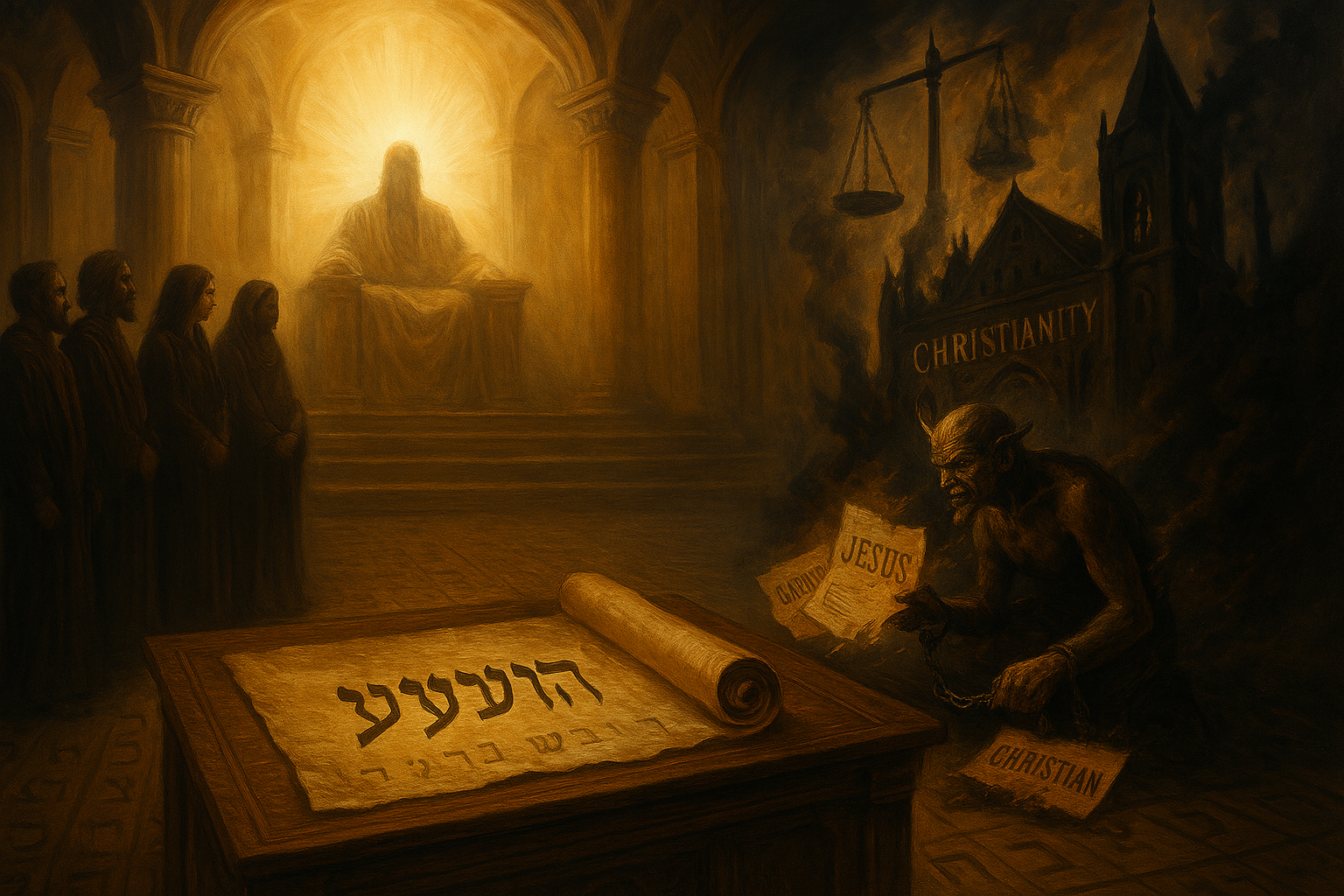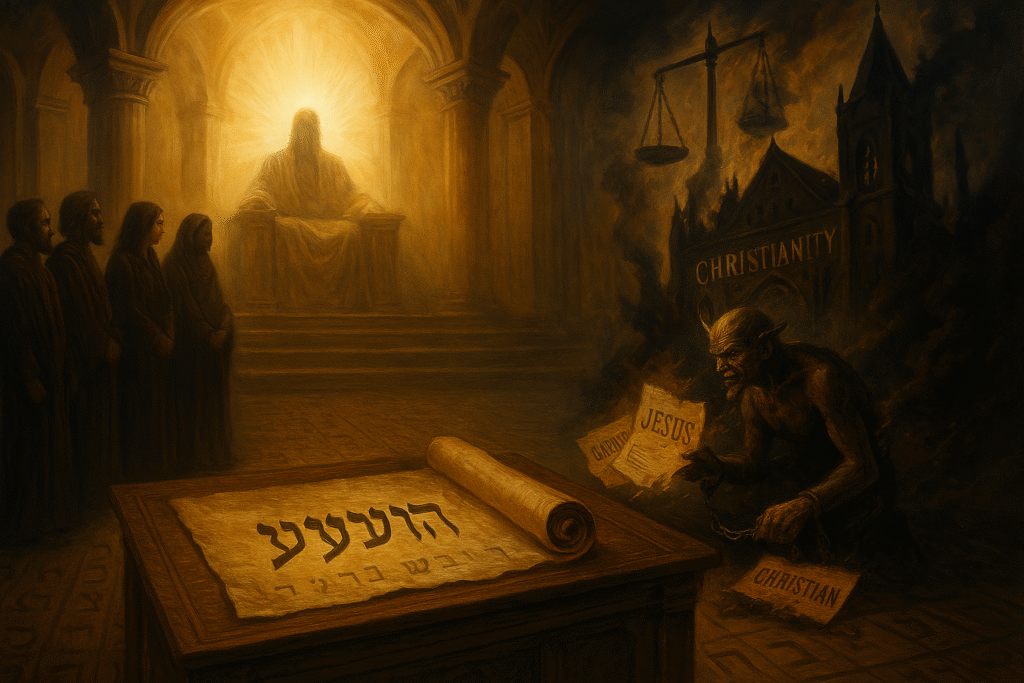Physical Address
304 North Cardinal St.
Dorchester Center, MA 02124
Physical Address
304 North Cardinal St.
Dorchester Center, MA 02124
With Michael Walker
With Michael Walker

To Whom it may concern…

There are moments when truth refuses to whisper. It stands, robes gathered, and reads the charge into the record. This is one of those moments. The case before us is not stylistic preference, denominational rivalry, or the petty squabble of schools; it is an identity trial. If it is of man, it is not of God. And if it is of man, it stands in the shadow of the adversary who traffics in substitutions, near-truths, and names with the fire siphoned out. We are not debating footnotes; we are weighing a forged passport against the authority of the King. The question is stark: will we cling to a system built by human hands and baptized in borrowed vocabulary, or will we return to the Name, the assembly, and the power that Yahweh actually gave?
The frame of judgment starts here: all things originate in God, but not all things align with God. The breath that animates humanity is His; the image stamped on our nature is His. Yet the heart, ungoverned by the Spirit, drifts—devising structures and stories that recast divine revelation into human manageability. In creation, Yahweh authors reality; in sin, man edits the manuscript and calls it a faithful edition. Sovereignty means God can weave even rebellion into His purpose, but sovereignty is not endorsement. Moral origin matters. To say something is “of man” is to say its source code has been altered—unaligned with the nature, voice, and instruction of the One who speaks worlds into being. The difference is not cosmetic; it is covenantal. The line is not thin; it is the chasm between living water and a painted river on a dry wall.
Into this world of edits and imitations came the Messiah, not to varnish religion but to end the need for it by fulfilling its purpose. His collisions with the religious establishment were not tantrums; they were rescues. He confronted a system that had learned to use the vocabulary of heaven to fortify the towers of men. He did not rebuke devotion; He rebuked the machine that turned devotion into leverage. He inaugurated a kingdom—breath before building, Spirit before structure, authority before administration. What He formed was an ecclesia, a called-out assembly that carried heaven’s verdict into the earth like a living court. What men later formed was Christendom, a fusion of faith with imperial reflexes: ritual without relationship, hierarchy without humility, dogma without the Dove, power without love. It was not born in the upper room; it was minted in the halls of empire.
Everything turns at the Name. In Hebrew, names do not merely label; they locate essence, assignment, and authority. The Name given from heaven was not a brand for banners; it was a key for doors. Yehoshua (יְהוֹשֻׁעַ) means “Yahweh saves”—not vague rescue, but the covenant God acting in His own Name. The syllables carry the signature. Strip the syllables and you do not have a casual nickname; you have a document with the seal removed. Yeshua (יֵשׁוּעַ), the shortened form, still orients toward salvation, but the full covenant thunder of the divine prefix is where the sword sings. Heaven’s instruction was precise because heaven is not careless with authority. “At the name” every knee bows because the Name is not a sound alone; it is a jurisdiction. Treating this as pronunciation pedantry is like mistaking a judge’s gavel for a decorative mallet; the wood is similar, but one moves nations and the other hangs on a wall.
History records a transliteration path—Yehoshua to Yeshua, to Greek Iēsous, to Latin Iesus, to an English form that became familiar the world over. But what reads like a tidy linguistic chart is, spiritually, a story of cultural colonization. The Hebrew root system was uprooted from its orchard and replanted in imperial marble. The living Name was fitted for a toga. A tongue can translate meaning; an empire translates ownership. When the Name is abstracted from its covenant soil, the sound may remain pronounceable, but the people forget where the river rises, and soon the river is only a metaphor. Imagine forging a power of attorney and changing the signer’s legal name by degrees; the ink dries, the stamp looks official, yet the bank will not honor what heaven did not authorize. Aligning to the Name is not fetishizing phonetics; it is plugging the lamp back into the only socket that carries current.
This is why a golden calf is more than an ugly statue in Exodus; it is a misrepresentation dressed in familiar language. “These are your gods, O Israel, who brought you up out of Egypt.” The words point in the right direction while the object points to a lie. So it is when a culture builds a Christ that fits its throne rooms, blesses its wars, and sanctifies its hierarchies. A clone is not a son. A mannequin can wear the robe but cannot carry the government. Call a wax figure “king” and it will never issue a decree; call a mistranslated, de-Hebraized construct “the Savior,” and it will never command the elements. Power is not sentimental; it follows the Name, and the Name follows the Father who gave it.
Identity theft did not stop at the Name; it extended to the people. The Messiah never instructed His followers to be “Christians.” That term arose from outside lips in Antioch, more badge than birthright. The self-identity He gave was ecclesia—a governmental assembly that binds and looses according to heaven’s law. Swap “ecclesia” for “church” as a religious venue, and you have replaced a court with a clubhouse. You can staff a clubhouse with sincere people and noble programs, but a clubhouse does not issue verdicts against gates of death. The difference is not semantic; it is strategic. Names govern function. A mislabeled tool is misused; a mislabeled people are defanged.
Here the story darkens, and clarity sharpens. The adversary’s vocation has always been substitution, the elegant counterfeit that looks right under soft light. He reached for the throne in a blaze of “I will,” fell, and then learned to bend kings and crowds with a softer metal: almost. In the garden he did not deny God; he nuanced Him. In Pharaoh’s edict and Herod’s massacre he lunged at the seed. In Judas he sought to kill the Messiah; the cross became the coronation he never foresaw. Failing to stop the Son, he moved to rename Him. Failing to destroy the assembly, he moved to rebrand and domesticate it. Tame the lion by putting a collar on His Name. Turn the upper room into an office. Replace breath with bureaucracy, decree with docket, fire with form. If he cannot keep you from the river, he will sell you a map and call it the same thing.
Christendom was the perfect habitat for such a project. From Constantine forward, the persecuted movement became a state apparatus. Councils crystallized truth and sometimes embalmed it. Creeds defended revelation and sometimes replaced relationship. Clerical ranks organized the household and sometimes barred the door. None of this requires sneering at every bishop or torching every church; good people built many buildings. But a good brick laid on a crooked plumb still leans. A branch can be green and yet grafted to the wrong tree. When the root is imperial possession rather than covenant submission, the fruit will taste of iron, not honey.
Reduce the fraction and the picture clarifies. Strip the layers the way you reduce eight sixteenths to one half, and the elaborate arguments collapse into a binary that cannot be evaded: either this thing stands in the current of what Yahweh spoke, or it stands outside it. Either we operate under the mandate of Yehoshua’s Name, or we operate under a brand designed by men and marketed by empires. There is no neutral ground where a man-made religion gets honorary citizenship in the kingdom because it borrowed holy words. He who is not with the Son as the Son named Himself and as the Son formed His assembly is against Him, even if his choir swells and his steeple gleams at dusk.
Call the verdict what it is: the idol known as Christianity—understood as the institutionalized, indoctrinated, empire-shaped system—was not merely an unfortunate drift; it was a satanic masterpiece of substitution. The evidence is historical, linguistic, and biblical. The Name was changed by degrees until the syllables of covenant were muffled. The people were renamed until the courtroom of heaven was mistaken for a weekly venue. The Spirit was replaced by scripts. The kingdom was traded for a crown that fits Caesar. This is not a blanket damnation of every soul inside the structure; it is the unmasking of the structure itself. There are saints in prisons and saints in cathedrals; heaven knows its own. But a prison with kind guards is still a prison, and a cathedral with tender hymns can still be a cage if the doors are locked against the Name and the Breath.
Consider the analogies heaven keeps pressing. Counterfeit currency can buy trinkets but not a kingdom; it circulates until it meets a light that exposes the watermark. A map can be beautiful, laminated and framed, but no one swims in blue ink. An unplugged lamp looks like every other lamp in the daylight; only night tells the truth. The ecclesia without the Name is a lamp on a shelf at noon—decor until the darkness arrives. Then the difference between a socket and a story becomes the difference between life and ruin.
What then shall we do? We do the only thing that has ever turned graves into gardens—we return. We return to Yehoshua, to the Name that carries the breath of Yahweh and the mission of salvation. We return to the ecclesia, not as a venue but as a verdict-bearing assembly that binds what heaven has bound and looses what heaven has loosed. We renounce the costume of empire and put on the yoke that is easy because it is living. We let the idol die, not by vandalism but by starvation—no more attention, no more allegiance, no more borrowing its vocabulary to dress our obedience. We ask for the Spirit not to accessorize our programs but to govern our steps, to teach our mouths to speak the Name with understanding, submission, and fire.
Here is the gravity of it all: names are gates, and identities are jurisdictions. If we keep the gate man built, we inherit the silence that haunts man-made courts. If we enter by the gate heaven opened, we inherit a kingdom that cannot be shaken. The consequences are not academic. A misnamed Christ leaves demons untroubled and captives unfreed. A misnamed people leaves cities unjudged and widows unheard. But the restored Name turns whispers into decrees, and the restored ecclesia turns gatherings into government. Choose, then, with eyes open. Either the cathedral or the kingdom. Either the brand or the Bride. Either the clone that flatters empires or the Son whose government rests on His shoulders. As for me, I will let the counterfeit crumble and cleave to Yehoshua. Let the remnant rise. Let the gavel fall. Let the Name be restored to the throne.